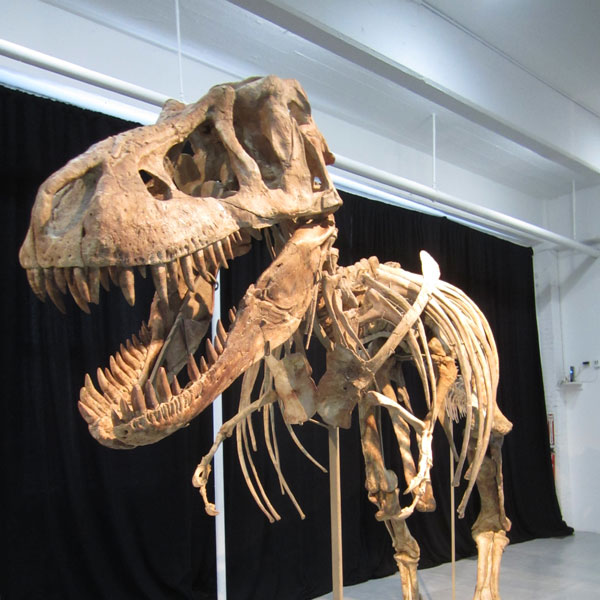US Attorney Demands Tyrannosaur Be Turned Over to Mongolia

Get the world’s most fascinating discoveries delivered straight to your inbox.
You are now subscribed
Your newsletter sign-up was successful
Want to add more newsletters?

Delivered Daily
Daily Newsletter
Sign up for the latest discoveries, groundbreaking research and fascinating breakthroughs that impact you and the wider world direct to your inbox.

Once a week
Life's Little Mysteries
Feed your curiosity with an exclusive mystery every week, solved with science and delivered direct to your inbox before it's seen anywhere else.

Once a week
How It Works
Sign up to our free science & technology newsletter for your weekly fix of fascinating articles, quick quizzes, amazing images, and more

Delivered daily
Space.com Newsletter
Breaking space news, the latest updates on rocket launches, skywatching events and more!

Once a month
Watch This Space
Sign up to our monthly entertainment newsletter to keep up with all our coverage of the latest sci-fi and space movies, tv shows, games and books.

Once a week
Night Sky This Week
Discover this week's must-see night sky events, moon phases, and stunning astrophotos. Sign up for our skywatching newsletter and explore the universe with us!
Join the club
Get full access to premium articles, exclusive features and a growing list of member rewards.
The United States Attorney's office has intervened in a dispute over a dinosaur that went up for auction at the end of May by suing to take possession of the fossils, with the intent of returning them to Mongolia.
Paleontologists and Mongolian officials have maintained that the skeleton, which belongs to a type of tyrannosaur called a Tarbosaurus bataar, was taken illegally from that country.
"The skeletal remains of this dinosaur are of tremendous cultural and historic significance to the people of Mongolia, and provide a connection to the country’s prehistoric past. When the skeleton was allegedly looted, a piece of the country’s natural history was stolen with it, and we look forward to returning it to its rightful place," Manhattan U.S. Attorney Preet Bharara said in a statement.
Mongolian President Elbegdorj Tsakhia attempted to hault the auction of the skeleton on May 20, however, the auction house in charge of selling it went ahead with the sale, making it conditional on court approval. An anonymous bidder has agreed to pay $1.1 million for the dinosaur, which is an Asian relative to the North American Tyrannosaurus rex.
Mongolian law makes vertebrate fossils found within its borders state property, and smuggling them out is a criminal offense. However, the fossils appear to have traveled from Japan to Great Britain, where one of the current sellers is based, before arriving in the United States, where another seller prepared the bones for auction at Heritage Auctions.
Paleontologists who work in Mongolia have complained of the illegal excavation and destruction of fossils.
To aid the Mongolian claim to the dinosaur, the federal government has focused on the circumstances under which the specimen arrived in the U.S. In its complaint, the U.S. Attorney claims the federal government has the right to seize the dinosaur, because those who imported the dinosaur did so knowing it was stolen, and the customs forms accompanying it contained false information. For example, the forms claimed the fossils' country of origin was Great Britain, rather than Mongolia, and also under-reported their value.
Get the world’s most fascinating discoveries delivered straight to your inbox.
The future of the Tarbosaurus is in the hands of lawyers and politicians now, according to Jim Halperin, co-chairman of Heritage Auctions. [See Photos of the Tarbosaur Skeleton] "We believe our consignor purchased (the) fossils in good faith, then spent a year of his life and considerable expense identifying, restoring, mounting and preparing what had previously been a much less valuable matrix of unassembled, underlying bones. We sincerely hope there will be a just and fair outcome for all parties," Halperin said in a statement.
Heritage Auctions has not revealed the identity of those selling the Tarbosaurus, but according to the complaint, the fossils were imported in March of 2010 from Great Britain to Florida. Customs forms list the ultimate consignee as Florida Fossils, a business that was at the time owned by Eric Prokopi. Prokopi currently operates Everything Earth, which offers paleotonological services. Neither Prokopi nor Everything Earth returned requests for comment in time for deadline.
Paleontologists believe the Tarbosaurus came from Mongolia, because clearly identifiable remains from this species have been found only in the Nemegt Formation, which is located in Mongolia.
"It is amazing, you can see how much progress we have made," said Bolorsetseg Minjin, a Mongolian paleontologist who was among the experts to examined the fossils on June 5 as part of an investigation. "In the end, we will have good news."
John Long, a paleontologist who was involved about eight years ago in Australian efforts to return fossils taken illegally from China, welcomed news of the federal action.
"This could be a major turning point for world heritage if the Mongolian Tarbosaurus bataar skeleton that was recently auctioned in (New York) is returned to its home country," Long, now at the Natural History Museum of Los Angeles County, told LiveScience in an email.
He pointed out that U.S. law, which allows for private ownership of fossils excavated from private, but not public, lands would not prohibit the sale of scientifically important fossils excaved within the U.S. abroad.
Follow LiveScience writer Wynne Parry on Twitter @Wynne_ParryorLiveScience @livescience . We're also on Facebook & Google+.
 Live Science Plus
Live Science Plus











